
Quake is a first-person shooter game developed by id Software and published by GT Interactive. The first game in the Quake series, it was originally released for MS-DOS, Microsoft Windows, and Linux in 1996, followed by Mac OS and Sega Saturn in 1997 and Nintendo 64 in 1998.

Star Trek: The Next Generation – A Final Unity is an adventure game by Spectrum HoloByte, based on the Star Trek universe. It was released in 1995 for DOS and later ported to the Macintosh. It puts the player in control of Captain Picard and his crew of the Enterprise D and features traditional point-and-click adventure gameplay as well as free-form space exploration, diplomatic encounters and tactical ship-to-ship combat.
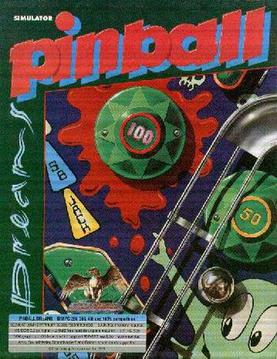
Pinball Dreams is a pinball simulation video game developed by Digital Illusions and originally released for the Amiga in 1992. It spawned several sequels, including Pinball Fantasies and Pinball Illusions. The MS-DOS port was digitally released by Rebellion Developments along with its sequel and Pinball Mania on February 22, 2011 on GOG.com with support for Microsoft Windows. It received an OS X build on April 23, 2013; and a Linux build on August 19, 2014.
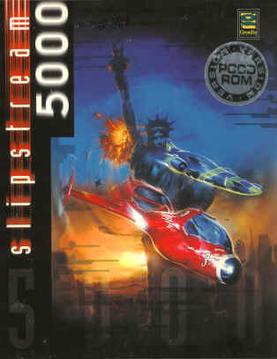
Slipstream 5000 is a 3D airplane combat/racing video game developed by The Software Refinery and published by Gremlin Interactive for IBM PC compatible computers in July 1995.

Magic Carpet is a 3D flying video game developed by Bullfrog Productions and published by Electronic Arts in 1994 for MS-DOS, PlayStation, and Sega Saturn platforms. Its graphics and gameplay were considered innovative and technically impressive at the time of its release.

Heroes of Might and Magic: A Strategic Quest is a turn-based strategy game developed and published by New World Computing in 1995 for DOS. A spin-off of New World Computing's Might and Magic series of role-playing video games, the success of Heroes of Might and Magic led to a number of sequels.

Puzzle Bobble 2 is a tile-matching video game by Taito. The first sequel to Puzzle Bobble, it is also known in Europe and North America as Bust-A-Move Again for arcades and Bust-A-Move 2: Arcade Edition for home consoles. Released into the arcades in 1995, home conversions followed for the PlayStation, Sega Saturn, Nintendo 64, and Windows platforms. The game was included in Taito Legends 2, but the US arcade version was included in the US PS2 version instead. Further ports for the Nintendo Switch, PlayStation 4, and Xbox One were released by City Connection alongside Puzzle Bobble 3 in February 2023.
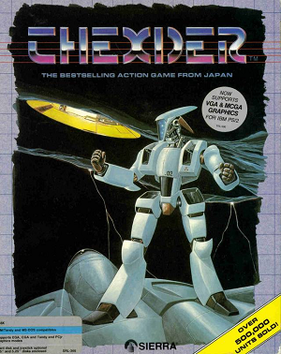
Thexder is a run and gun video game from Game Arts, originally released for the NEC PC-8801 in 1985. It was ported to many systems, including the Famicom, MSX, Apple II and DOS. It was a commercial success, selling over one million units worldwide.

MechWarrior 2: 31st Century Combat is a vehicle simulation game developed and published by Activision, released in 1995 as part of the MechWarrior series of video games in the BattleTech franchise. The game is set in 3057, and is played as a tactical simulation that incorporates aspects of real-time first-person combat and the physical simulation of the player's mech. It is a game recreation of the "Refusal War." The player can join one of the clans, Clan Jade Falcon or Clan Wolf while engaging in up to 32 missions.

Indiana Jones and His Desktop Adventures is a 1996 adventure video game. Desktop Adventures was made to run in a windowed form on the desktop to limit memory use and allow the player to perform other tasks. This game was the first Desktop Adventures game, and was followed by Star Wars: Yoda Stories in 1997.

The Need for Speed is a 1994 racing game developed by EA Canada, originally known as Pioneer Productions, and published by Electronic Arts for 3DO. It was later ported to other platforms with additional tracks and cars, including to MS-DOS, PlayStation, Sega Saturn, and Microsoft Windows in 1996, on which it was subtitled SE.
Links is a series of golf simulation video games, first developed by Access Software, and then later by Microsoft after it acquired Access Software in 1999. Microsoft also produced its own series of golf games based on Links, under the title Microsoft Golf. The Links series was a flagship brand for Access, and was continued from 1990 to 2003. The first game in the series, Links: The Challenge of Golf, won Computer Gaming World's 1991 Action Game of the Year award.
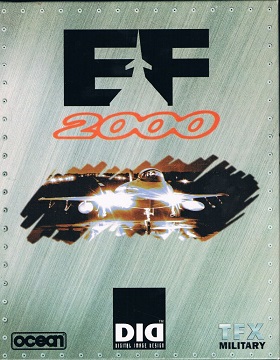
EF2000 is a combat flight simulator video game developed by Digital Image Design (DID) and published by Ocean Software in 1995 for the PC DOS. It is the sequel to DID's earlier software title, TFX. An expansion pack, EF 2000: TACTCOM, was released in 1996. A compilation, EF 2000: Evolution, that included the main game and the expansion was released in 1996. An updated version, Super EF2000, was released exclusively for Windows 95 in 1996 in Europe. In 1997, a compilation titled EF2000 V2.0 was released in North America that included the original DOS versions of EF2000 and TACTCOM and also the Windows exclusive Super EF2000. In June 1997, the graphics were boosted when DID released the "Graphics+" patch, which added Rendition Vérité hardware support and Glide API for 3dfx graphics card support to EF2000.
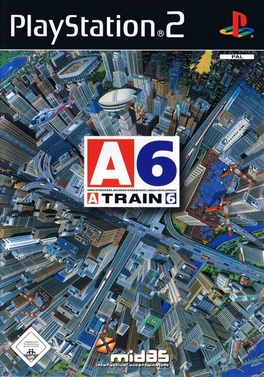
A-Train is a series of business simulation video games developed and published by Japanese game developer Artdink in Japan. The first game in the series was published in 1985. The first release in the United States was Take the A-Train II, published in 1988 by the Seika Corporation under the title Railroad Empire. However, the most well known U.S. release is Take the A-Train III, published in 1992 by Maxis as simply A-Train. There is also the spin-off title C.E.O.

Warcraft II: Tides of Darkness is a fantasy real-time strategy computer game developed by Blizzard Entertainment and released for MS-DOS and Microsoft Windows in 1995 and Mac OS in 1996 by Blizzard's parent, Davidson & Associates. A sequel to Warcraft: Orcs & Humans, the game was met with positive reviews and won most of the major PC gaming awards in 1996. In 1996, Blizzard released an expansion pack, Warcraft II: Beyond the Dark Portal, for DOS and Mac OS, and a compilation, Warcraft II: The Dark Saga, for the PlayStation and Sega Saturn. The Battle.net edition, released in 1999, included Warcraft II: Beyond the Dark Portal, provided Blizzard's online gaming service, and replaced the MS-DOS version with a Windows one.

Loadstar: The Legend of Tully Bodine is a video game developed and published by Rocket Science Games for the Sega CD in 1994 and MS-DOS compatible operating systems in 1995.
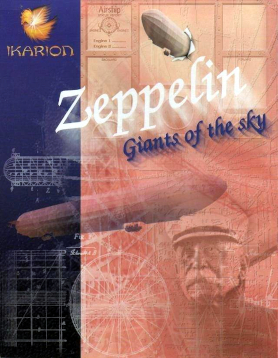
Zeppelin is a video game developed by German studio Ikarion and published by MicroProse for the Amiga and MS-DOS compatible operating systems in 1994.
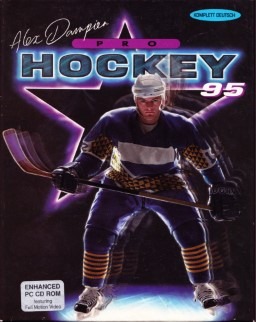
World Hockey 95 is a video game developed by American company Merit Studios and published by SoftKey for DOS. The game had different titles in various regions including Alex Dampier Pro Hockey 95, Alex Dampier World Hockey 95 and Pro Hockey

Links: The Challenge of Golf is a golf video game developed by Access Software. It was published for MS-DOS in 1990, followed by the Amiga in 1992. A Sega CD version, developed by Papyrus Design Group, was released in 1994. It is the first game in the Links series, and was followed by Links 386 Pro (1992). A Microsoft Windows version, titled Microsoft Golf, was released in 1992 as the first game in the Microsoft Golf series.


















